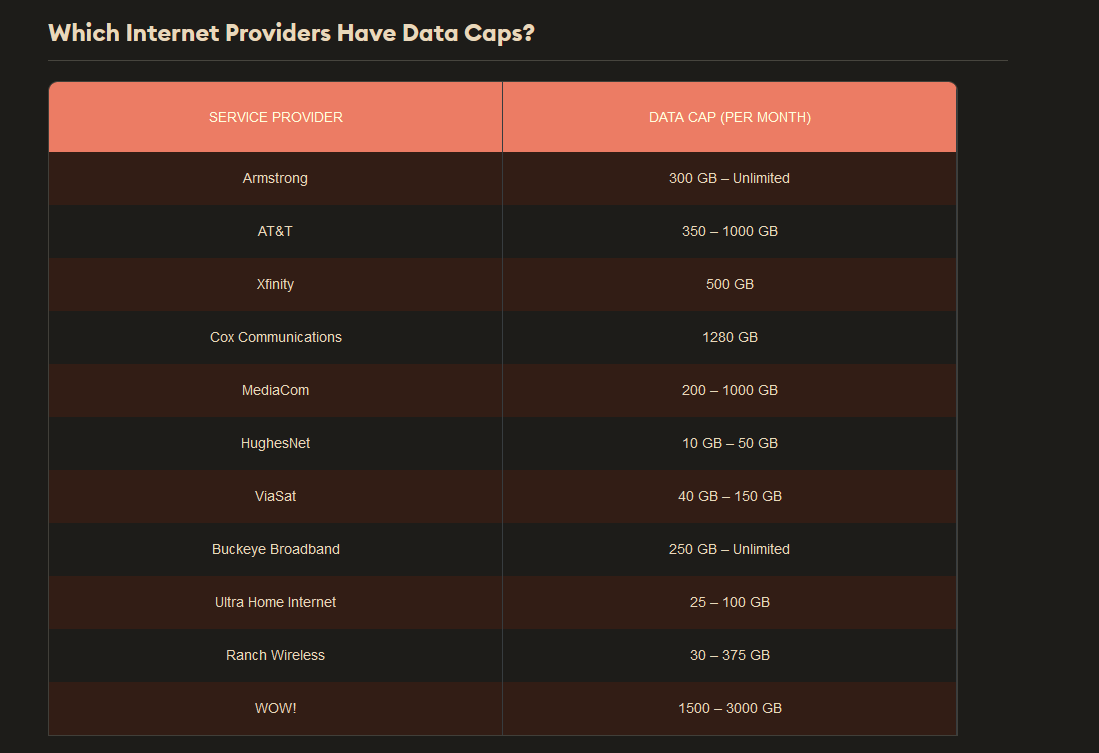Why do cell phones have a data limit but home internet doesn’t? I understand bandwidth limits, but how can home internet get away with giving users all the data they can use, but cell phone providers can’t?
Home internet usually does, it’s just pretty high.
Not all of them do, I’ve seen that in America data limits on home internet is common, and here in Europe unlimited phone data is common.
They do have unlimited data plans here and it’s at same price as your average wifi plan.
Umm, my home internet has a 50GB per month limit. Can’t complain much though, it’s cheap at literally $1 a day, and I’m not a gamer or online streamer.
50GB a month though?? You don’t use any video streaming services at all? What do you use for media?
I do browse through YT videos, but I don’t bother watching full length movies. Honestly, I’ve lost interest in watching newer movies, seems like a waste of time to me. However, I do enjoy educational and scientific content.
Good thing, because some games would take up all of that just to download and install.
How is 1€/day cheap for such limited home Internet? I guess it might depend on where you are, but unless you are in the middle of nowhere that seems expensive.
Here in Germany for example, which really isn’t known for its cheap internet, I can find options that offer 100Mbit Flatrates for 20€/month.
$50/mo for internet is a relatively low rate for the US unless you’re lucky enough to live in one of the few places with municipal internet.
My German friends and family don’t believe me when I tell them how expensive internet and phone is in the US. They all think it’s expensive in Germany. Having said that, there are some big differences in take home pay.
I ain’t even talking about the internet speed, I’m talking about the data cap. And $1 a day is about as cheap as it gets in my area.
as cheap as it gets in my area
That’s not a very good approach to assess prices
Wow I go through 50GB in less than a day. Sometimes an hour.
That’s more than $1.50 per Gigabyte.
When you download a game from Steam, most games you literally pay more for the data than for the game.
Even when you pirate, you pay like $5 for a BluRay quality movieYou’d be dumbfounded to see what I’ve been able to accomplish using my connection. Terabytes of games archived, I just didn’t have to download nor upload them myself.
Where even has that sort of plan anymore? Are you really rural American?
Guess so. The installation tech had to test like 18 sets of dead phone lines before managing to find one live pair to even connect the internet.
For ~$30 a month, that’s a complete and utter rip-off.
Even here in Neuland Germany you get at least decent internet with no caps for that price.
AOL used to be $19.95/mo for forty hours, then an additional charge per minute beyond that.
Oh god, taking me back to their stupid always-on-top timer on the screen. It was anxiety inducing. I’m so glad pay by the minute internet didn’t last, can you imagine??
I can. My phone bills were over $400 for a while in the early 90s. $400 in 1994 is worth over $850 today.
Home internet had data limits too. In fact, you originally paid by the minute of usage through your telephone line before flat rates became a thing, blocking all calls in the process. Back in the day we’d use various time limited free trials by AOL and other ISPs to browse (Freenet was a very big one here in Germany), which they kinda threw out battling each other for customers. Look up AOL free trial CDs for example.
Playing devil’s advocate here. A possibly legitimate reason ISPs put in data caps is wireless spectrum congestion.
Playing devil’s accountant here. A possibly legitimate reason ISPs put in data caps are shareholder dividends and capital appreciation.
- Charge more
- Provide inferior service
- Profit
It’s going to be precisely the reason. If you have a dedicated wire, fibre or copper then the entire available bandwidth is available per connection (one caveat with copper is crosstalk but it is minimal and can be mitigated). With fibre the available bandwidth per strand is huge.
It’s so fast that even where there’s contention, it is rarely a problem that everyone sharing a part of the connection is downloading or uploading at once. So pretty much most of the times you test, you get the full speed.
With mobile data, the entire cell is sharing a small amount (in comparison) of spectrum. Unlike a wire, the entire spectrum cannot be used by a single tower, a pretty small number of channels are carved out for them. Also because the signals are travelling through the air, there is more of a problem of signal loss and interference to contend with, so the channels very rarely reach the maximum possible speed (forward error correction and reducing bits per symbol to reach a suitable signal to noise ratio both will reduce speed for example.
For upload (which isn’t usually much of an issue) there’s another problem of guard time between timeslots. When downloading, the cell transmitter transmits the whole time and shared the channel between all users (another thing that can slow things down) so there’s no problem of needing a guard time. But when it’s separate transmitters (phones) sending there’s going to be a guard time between different handsets timeslot and the more active transmit stations there are (phones) the more these guard times add up to wasted bandwidth. Luckily most people are downloading far more than uploading, so it’s less of an issue.
I think for these reasons caps are used to limit people from ALWAYS consuming data on the cell/mobile networks and instead using wifi wherever they can in order to keep it fast for those that do/need to.
It’s a self managed QOS. If the customer knows they can only use X data they’re going to be a bit more cautious about using it. Vs if they have unlimited data then they’ll just download that 50 gig file on their phone because “fuck it why not”. The less data each individual customer uses the less infrastructure they have to build, and the faster/more consistent their existing stuff will be.
Cell tower time is a LOT more expensive than time on a fiber optic cable. Your ISP installs a few boxes to serve your neighborhood, a cell carriers tower might go 20 miles.
It is a proxy for don’t use too much on the busy towers. In small towns it doesn’t matter, but if you are in a downtown the tower will have many people connecting to it and the radio frequencies are shared. By putting a limit on everyone they force better sharing of that limited bandwidth. The limit is very large - far more that than the large abusers will use alone, but in a dense areas it is less than the common person will use all at once.
Tmoblie has (or had?) a binge on plan - if you used video (which we quickly figured out meant low quality - but probably good enough for a tiny phone screen) or audio you were using a lot of data, but it was consistent all day and so they didn’t have to count it - if the tower doesn’t have enough bandwidth for everyone on the first day of the month they have to fix that. That is the real worry: the tower running out of bandwidth on the first day of the month.
Lots of home internet does have a data cap, but you might not realize it. Typically what will happen is that, once you hit your cap, you’ll be rate throttled. That throttle might not affect most video streaming since Netflix is really good at video compression, but you’ll see the hit if you are, for instance, downloading large games from PSN, Steam, etc.
I went over my home data cap a couple times. The ISP rep was not amused when I called to have them bump my speed down to the lowest tier and add unlimited data. I pay less now and the speed difference is not noticeable for me with daily usage. I told them I was going to download random crap all day, delete, and redownload out of spite lol.
If my phone didn’t have a cap, I’d hotspot it all, which is basically the idea of cellular home internet routers. I found a home router without a cap, which time will tell to be true, but it’s still more expensive than my phone with a very large but not unlimited cap.
They want to get paid, that’s the reasoning. The amount of data is really irrelevant except for pricing.
Roaming fees used to be the same until EU stepped in. Hopefully EU will eventually step in and order a full stop to ALL CAPS too. We live in the “future” now, right? Bring me ny free unlimited connection so I can download that car they talked about.
Neither of those statements is universally true. It is a tendency, but not a universal rule.
Mobile internet is newer, less essential to many people, and I think mostly more costly to operate for the ISP per amount of data transferred, so this is why it tends to be the case. But there are unlimited mobile plans and limited home plans too in the world.
I am lucky to have a local ISP that is amazing. I’m hoping that they never change.
AT&T asks the same question. They provide the bold option to pay more than the competition and get data limits on your home internet.
Home Internet usually doesn’t have unlimited internet. There’s usually caps baked in somewhere. Don’t believe me? Read the fine print. At some point, at some bandwidth usage in the monthly cycle, they will throttle the living crap out of your connection. It’s written into pretty much every contract I’ve ever signed, and I’ve been with over a dozen carriers of landline internet over the years.
The reason being that they don’t want you serving websites or business class functionality with residential level internet. They didn’t build their network with those constraints. They want you paying for and using the business internet package, which has dedicated bandwidth and no caps because you’re paying for a dedicated line to be run.
For mobile phones? Old pricing models still trying to be relevant. There’s no technical reason.
I’ve read the contract of my internet provider. No limit
Then again, I don’t live in the US
Home internet has unlimited internet
It’s not 2002
Well, maybe not in that…one… country
There’s “hard” caps, and there’s “soft” caps. When you hit the soft caps with many of these ISP’s, they start throttling your internet usage by a substantial amount.
Relevant Screenshot of caps as of Sept 2024.

I am in the US and I do not have a hard cap, and I regularly go WELL above the soft cap listed for my ISP in that image with no throttling.
I said “home internet hasn’t had data caps for a couple of decades, well except maybe in that one country where people have no consumer rights and everyone gets fucked up the arse for money just for existing”. I’m paraphrasing here.
You said - “Oh yeah, let me prove you right!”
I’m not sure where you’re going with this
Ok, I missed the sarcasm and allusion to the US as the country you were talking about. That’s fair.
I assumed the OP was asking the question for the US. Which of course, is the thing people in my country do. Assume everything is about us ;)
Weird how 97% of people don’t think that eh? 😂
Closer to 96/95% now ;) But yeah, your point stands. What’s even worse about this, is I’m working on a dual citizenship with Portugal, so I should have had more self-awareness than I showed ;)
I can only speak from a UK perspective, but most home ADSL/VDSL/Fibre providers don’t have limits, other than “if your usage is tanking the network, we’ll ask you to knock it off” type clauses.
Most providers are also signed up to an agreement that if your speed drops 50% below the agreed speed on the package on average, they’ll either give you refunds, or let you out of the contract.
The only ones that throttle are the bargain basement operators aimed at people who don’t care, and one otherwise very competent provider that for some unexplainable reason only gives 1TB by default, charging an extra £10 for 10TB.
And I guess there is also a pricing step up to guaranteed bandwidth. For business use, they tend to be things like 1gbits headline, 500mbit guaranteed burst, 100mbit guaranteed sustained.







